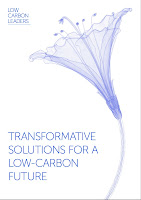The Shallows: What the Internet Is Doing to Our Brains, by Nicholas Carr
/ A book with very interesting theme, but with too much of a shallow approach. Nothing really new, but a few reminders that are healthy in our time. The obvious fact that: “every intellectual technology…embodies an intellectual ethics, a set of assumptions about how the humand mind work and should work” should be something that any reflecting person understand today. But speaking at Techonomy Eric Smith said “The technology of course is neutral but society is not fundamentally ready.". Hopefully this was taken out of context as Eric should be smarter than that.
Techonomy a an interesting initiative/conference that seem to want to put ethics into our economy by using the inspiration/power of technology in an interesting way. Will be interesting to see where they go next, this year was a US focused event with the usual suspects, probably to ensure funding, but with a slightly more diverse invitation list and a little more focus on implementation and urgency this could be interesting.
A book with very interesting theme, but with too much of a shallow approach. Nothing really new, but a few reminders that are healthy in our time. The obvious fact that: “every intellectual technology…embodies an intellectual ethics, a set of assumptions about how the humand mind work and should work” should be something that any reflecting person understand today. But speaking at Techonomy Eric Smith said “The technology of course is neutral but society is not fundamentally ready.". Hopefully this was taken out of context as Eric should be smarter than that.
Techonomy a an interesting initiative/conference that seem to want to put ethics into our economy by using the inspiration/power of technology in an interesting way. Will be interesting to see where they go next, this year was a US focused event with the usual suspects, probably to ensure funding, but with a slightly more diverse invitation list and a little more focus on implementation and urgency this could be interesting.
Back to the book, where a number of quotes present some interesting thoughts by less known thinkers. De Forest, who invented the Audion/early transistor, is one example of a person who thought about the use of his technology. As all reflecting persons he felt torn as the powerful tool could be used in both good and bad ways. I particularly like his observation of mainstream media that he described in the following way: “A melancholy view of our national mental level is obtained from a survey of the moronic quality of the majority of today’s radio programs.”.
I would like to have seen a lot more discussion about the actual impact on the brain. Intuitively it make sense to assume that heavy browsing result in a situation where “certain cognitive skills are strengthened sometimes substantially… These tend to involve lower-level, or more primitive, mental functions such as hand-eye coordination, reflex response, and the processing of visual cues.”. Still is would be interesting to put these skills in a broader context and ask what kind of society this would encourage and what kind of ethics that could be enhanced.
If it is true that browsing the web is not only “diverting resources from our higher reasoning faculties but obstructing the consolidation of long-term memories and the development of schemas” people would be less able to understand more complex narratives, let alone create new. In a time where a paradigm shift is needed this is no small thing.
Add to this that our capacity for empathy might be reduced. “the more distracted we become, the less able we are to experience the subtlest, most distinctively human forms of empathy, compassion, and other emotions.”
Some serious research, supported by technology companies, would be welcome…
I have my own ideas about the possibility that the web can bring. And while I agree that the negative aspects is what we see most of today hyper/radical transparency though augmented reality can contribute to a new situation that support empathy and innovation for “real challenges”. Such a development would also move ethics and empathy to a whole new level (that is the idea/vision behind my current work with smart phone applications).


































